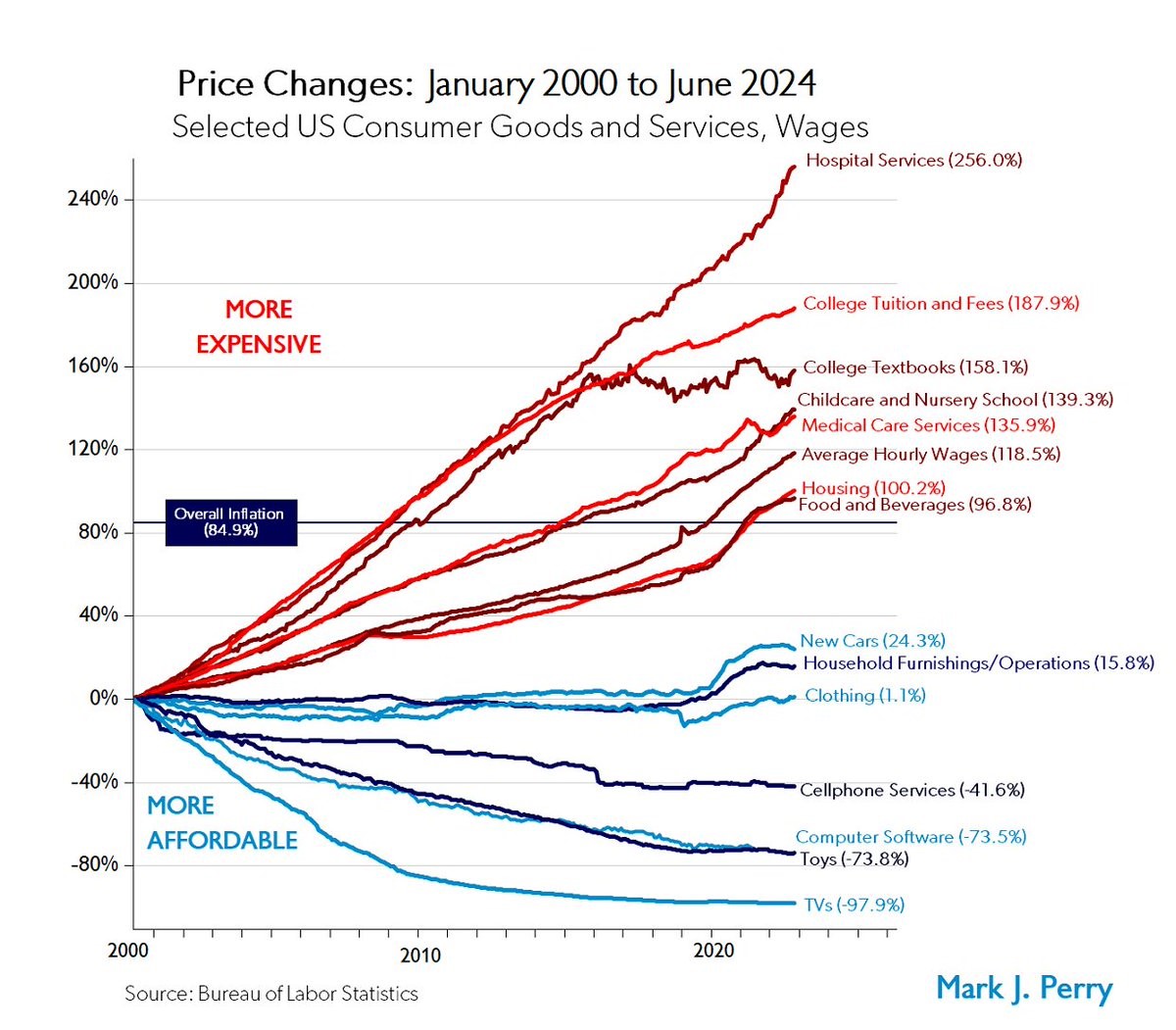Today, I want to ask you a question.
It’s a controversial question. A provocative question.
Is globalisation screwing over your family? Worse still, is globalisation destroying your family before your very eyes?
Yes? No? Maybe?

Source: Mark J. Perry / X
Now, for the sake of perspective, I want you to take a look at the image above. It’s called the ‘Chart of Century’:
- This tracks the prices of goods and services in the United States over a 24-year period. It paints a striking picture, doesn’t it? Indeed, this is a tale of two economies.
- On one extreme, you have hospital services, where the cost has skyrocketed by over 250%. Meanwhile, on the other extreme, you have televisions, where pricing has plunged by over 90%.
- In other words, essential services have become increasingly expensive, while consumer goods have become increasingly cheap.
The disparity here is astonishing. How did this happen?
- Well, over the past two decades, we’ve been fed a rosy story about globalisation. The narrative usually goes like this: Globalisation is a miraculous thing. It’s a rising tide that lifts all boats. It has given us cheaper products. More job openings. More travel opportunities. An increasingly connected world.
- Well, there’s no denying the fact that globalisation has done wonders for consumer goods. By outsourcing to low-wage Third World countries, Western companies have been able to slash the price of anything they can slap a barcode on. For them, this has felt like a sweetheart deal. It’s about lower production costs and higher trade volumes. Ka-ching!
- But wait. Hold on. What about healthcare? Education? Childcare? Ah, yes. That’s where it gets logistically tricky.
- You see, these services can’t be shipped across borders in cargo containers. In fact, they remain local. Deeply rooted in our communities. And yet these services can’t be delivered efficiently. This is because they’re often tangled up in bureaucratic red tape. Strangled by compliance.
I dare say, globalisation’s magic wand hasn’t improved the quality of these services. In fact, it’s possible that globalisation has actually made them worse:
- Just think about it. Yes, that new 75-inch OLED television might make your living room look more fashionable. More cool. But let’s face it: that TV is not going to save your life when you’re sick. Nor will it give your kids and grandkids a shot at a decent future.
- So, here’s the unspoken truth: modern consumerism is shockingly shallow. No amount of fairy dust will ever disguise the fact that rising service costs have outpaced average incomes.
- This makes globalisation almost worthless when it comes to the things that actually matter. For your family. For my family. For all families.
So, why on earth are we even in this situation? Why do we need cheap goods more than we need quality services? Seriously, what’s the justification here?
- Well, I believe part of the problem here is optics. Consumer goods are tangible. Yes, you can hold them. Yes, you can show them off. In fact, globalist politicians love pointing to them as proof of economic progress.
- This is because globalisation thrives on mass production. Anything that comes off an assembly line is easy to package. Easy to market. Easy to sell. Indeed, on a material level, it’s extremely easy to scale up the production of consumer products.
- But what about essential services like healthcare or education? Well, these things depend on supply chains that are more intangible. This means they’re harder to fix. Harder to improve. Harder to upsize. After all, you can’t mass-produce a doctor’s care. Nor can you mass-produce a teacher’s attention.
- Still, you might argue that such services are absolutely critical to your quality of life. These services are high-value, high-impact items. They are important to your family’s wellbeing. This is true even if a company can’t figure out how to sell them in a 30-second advertisement.
Meanwhile, here’s another pressing problem. It’s about the death of domestic manufacturing in the Western world:
- You already know this. Globalisation has hollowed out America’s industrial heartland. States like Ohio, Michigan, and Pennsylvania have borne the full brunt of this transition. Mills, foundries, and factories have all shut down, devastating local communities. They call this the Rust Belt.
- Here in New Zealand, we have our own tragic tale as well. Up until 1998, foreign automakers like Ford, General Motors, and Honda actually had car-assembly plants in our country. But — hey, presto — along came globalisation. Completely dislocating the local supply chains. Plants in Thames, Lower Hutt, and Nelson were closed down in favour of outsourcing and offshoring.
- Is this bad? Yes, absolutely. I believe that when nations lose their manufacturing base, we experience a loss of value. A loss of community cohesion. A loss of hope.
So, ultimately, this is where globalisation has betrayed us. It has given us a system that’s heavily commoditised. It floods us with affordable plastic distractions from abroad, even while life’s essentials at home slip further out of reach:
- So, in the end, we find ourselves caught in a troubling paradox. Outwardly, we celebrate material abundance because of liberalised trade. But inwardly? Well, we suffer from a creeping sense of social insecurity.
- Perhaps the biggest illusion of globalisation has been the idea that cheaper is always better; that consumerism equals prosperity. But when essential services spiral beyond our means, we quickly realise how hollow this promise is.
So, how can we fix this problem? How can we protect our family’s future? What does the horizon ahead look like?
- Well, first things first. We need to stop worshipping at the altar of globalisation. We need to stop treating global trade like some sacred cow. After all, if the system is broken, we need to be courageous enough to say so.
- In the long-term, I suspect that a more localised, resilient economy may hold the key. This is about the careful recalibration of trade deals, as well as a renewed commitment to self-sufficiency.
- Over the past 25 years, we have talked a great deal about foreign supply chains. But what about local supply chains? Aren’t they worth supporting? Don’t they matter?
- We should demand an economy that doesn’t just flood our market with cheap consumer goods from abroad. Instead, we should demand an economy that creates strong essential services on a local level with lasting value.
- After all, true wealth shouldn’t be measured in televisions or smartphones. It should be measured in secure families, educated children, and healthy communities.
- It’s all about using our God-given common sense to flip the script. Real happiness isn’t found by shopping at a cheap bargain-bin retailer. Real happiness is found by nurturing a well-rounded life. We shouldn’t forget that.
Will you do our 3-Minute Reader Survey?
Please tell us what you think…
Source: Image generated by OpenAI’s DALL-E
Here at Wealth Morning, our mission is simple:
- We exist to serve you — and our goal is to give you unfiltered, uncensored information about wealth and prosperity.
- We care deeply about family values — and we believe that there’s no greater goal than protecting and growing intergenerational wealth.
- We look at positive long-term value — and we believe this can be found if we unearth opportunities beyond the radar.
- Here at our trading desk in Auckland, we work hard for our clients — and we are not afraid of thinking differently.
So, right now, we really want to understand your concerns:
- Are you enjoying our weekly content?
- What urgent financial topics would you like us to cover?
- What’s your biggest wealth problem that you’re wanting to address immediately?
We’d love to hear your opinions on this. We’d love to get your feedback:
- So, right now, we’re inviting you to do our 3-Minute Reader Survey. It’s quick. It’s easy. Your viewpoint matters to us.
- Thank you so much in advance for your kindness and generosity. Your readership keeps us going!
Regards,
John Ling
Analyst, Wealth Morning
(This article is the author’s personal opinion and commentary only. It is general in nature and should not be construed as any financial or investment advice. Wealth Morning offers Managed Account Services for Wholesale or Eligible investors as defined in the Financial Markets Conduct Act 2013.)






John is the Chief Investment Officer at Wealth Morning. His responsibilities include trading, client service, and compliance. He is an experienced investor and portfolio manager, trading both on his own account and assisting with high net-worth clients. In addition to contributing financial and geopolitical articles to this site, John is a bestselling author in his own right. His international thrillers have appeared on the USA Today and Amazon bestseller lists.